|
|
|
Sort Order |
|
|
|
Items / Page
|
|
|
|
|
|
|
| Srl | Item |
| 1 |
ID:
131565
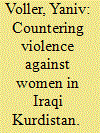

|
|
|
|
|
| Publication |
2014.
|
| Summary/Abstract |
The struggle against gender-based violence in the Iraqi Kurdistan Region has witnessed some significant achievements since the late 1990s. A subject long excluded from public discourse in the region, it has now moved increasingly into the mainstream, compelling the Kurdistan Regional Government (KRG) to take legal and practical measures against such practices as honor killings, female genital mutilation, and domestic violence. This article traces the sources of these shifts in the KRG's stance, looking especially at the role of transnational women's rights networks in the region. It highlights these networks' successful strategy of binding their cause to the KRG's endeavor to legitimize and consolidate its contested sovereignty over the Kurdistan Region. In doing so, the paper addresses an underexplored subject in the literature on women's rights campaigns in the Kurdistan Region and contributes to the study of transnational advocacy as a source of normative change.
|
|
|
|
|
|
|
|
|
|
|
|
|
|
|
|
| 2 |
ID:
131560
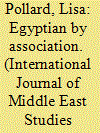

|
|
|
|
|
| Publication |
2014.
|
| Summary/Abstract |
In this article I argue that the Egyptian state emerged as a welfare provider in the mid-20th century, first by depending on the services of charitable societies to feed, educate, and provide medical assistance to the poor, and later by imitating and harnessing the activities of charitable societies. Drawing on correspondence between the state and service societies from the 1880s to 1945, when King Faruq (r. 1936-52) granted the Egyptian Ministry of Social Affairs (MOSA) the authority to define and to circumscribe the activities of social welfare organizations, the article illustrates the interactions of and the similarities between private and state-sponsored charity. The article further suggests that the establishment of MOSA helped to consolidate the hegemony of the Egyptian state over society and, at the same time, exemplified a dialectical process of state formation engaged in by Egyptian heads of state, service organizations, and the Egyptians whose needs they served.
|
|
|
|
|
|
|
|
|
|
|
|
|
|
|
|
| 3 |
ID:
131564


|
|
|
|
|
| Publication |
2014.
|
| Summary/Abstract |
This article reads Bashar al-Asad's rule through the prism of social activism and, in particular, through the field of charities. The sociopolitical transformations Syria experienced between 2000 and 2010-the shift in state-society relations, the opening of the civic arena, and economic liberalization-are explored through the activities of charitable associations, including their interactions with other Syrian actors, and we argue that they reflect the unraveling of the old social contract. The Syrian leadership outsourced important state welfare functions to charities while also creating nongovernmental organizations (NGOs) under its own control and supporting developmental NGOs loyal to the regime. These NGOs differed from the existing charities in terms of their social base, financial backgrounds, motivations, modes of institutionalization, and public relations strategies, and enabled the authoritarian regime to pursue a new strategy of divide-and-rule politics. At the same time, subcontracting poor-relief measures to charities eroded the regime's political legitimacy and helped sow the seeds of the 2011 uprising.
|
|
|
|
|
|
|
|
|
|
|
|
|
|
|
|
| 4 |
ID:
131567
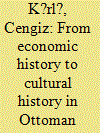

|
|
|
|
|
| Publication |
2014.
|
| Summary/Abstract |
Reflecting on the state of Ottoman social history poses a paradox. On the one hand, it is impossible not to appreciate the great strides accomplished over the past three decades. Earlier approaches have been challenged, topics that were previously untouched or unimagined have been studied, and the foundations of a meaningful dialogue with historiographies of other parts of the world have been established. On the other hand, the theoretical sophistication and methodological debates of Ottoman social history still look pale compared to European and other non-Western historiographies in the same period.
|
|
|
|
|
|
|
|
|
|
|
|
|
|
|
|
| 5 |
ID:
131574
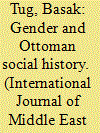

|
|
|
|
|
| Publication |
2014.
|
| Summary/Abstract |
Starting with Said's critique of Orientalism but going well beyond it, poststructuralist and postcolonial critiques of modernity have challenged not only one-dimensional visions of Western modernity-by "multiplying" or "alternating" it with different modernities-but also the binaries between the modern and the traditional/premodern/early modern, thus resulting in novel, more inclusive ways of thinking about past experiences. Yet, while scholars working on the Middle East have successfully struggled against the Orientalist perception of the Middle East as the tradition constructed in opposition to the Western modern, they often have difficulties in deconstructing the tradition within, that is, the premodern past. They have traced the alternative and multiple forms of modernities in Middle Eastern geography within the temporal borders of "modernity." However, going beyond this temporality and constructing new concepts-beyond the notion of tradition-to understand the specificities of past experiences (which are still in relationship with the present) remains underdeveloped in the social history of the Middle East.
|
|
|
|
|
|
|
|
|
|
|
|
|
|
|
|
| 6 |
ID:
131576
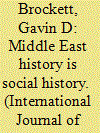

|
|
|
|
|
| Publication |
2014.
|
| Summary/Abstract |
My engagement with the social history of the Middle East, as I embarked on graduate studies, coincided with Judith Tucker's lamentation in 1990 that it was a field understudied to the point of being largely ignored. I came to the study of this new region with training in the native history of Canada, which had introduced me to the challenges and rewards of reconstructing the stories of people who had been denied agency in a narrative dominated by European conquest and nation-building.
|
|
|
|
|
|
|
|
|
|
|
|
|
|
|
|
| 7 |
ID:
131578


|
|
|
|
|
| Publication |
2014.
|
| Summary/Abstract |
When I was in graduate school, in the 1980s, one frequently heard complaints about the comparatively unsophisticated nature of the historiography of the medieval Middle East. There was considerable envy of historians in fields like early modern European history, who pushed broader disciplinary limits and whose works were read not just for content but also for historiographical and theoretical inspiration. There were some in our own corner of the profession blazing new methodological trails-Clifford Geertz, for example, who, though not a historian, had much to say to historians, and whose books were read eagerly by historians, and not just in Middle Eastern history; or Fedwa Malti-Douglas, as much at home in feminist literary theory as in medieval Arabic literature. But many graduate students in Middle Eastern history felt a bit underrepresented on the cutting edge of historical thought and practice.
|
|
|
|
|
|
|
|
|
|
|
|
|
|
|
|
| 8 |
ID:
131566
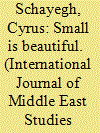

|
|
|
|
|
| Publication |
2014.
|
| Summary/Abstract |
In scholarship on the Middle East, as on other regions of the world, the sort of social history that climaxed from the 1960s through the 1980s, and in Middle East history through the 1990s-that is, studies of categories such as "class" or "peasant"-has been declining for some time. The cultural history that replaced social history has peaked, too. In the 21st century, the trend, set by non-Middle East historians, has been to combine an updated social-historical focus on structure and groups with a cultural-historical focus on meaning making. Defining society against culture and policing their boundaries is out. In is picking a theme-consumption or travel, say-then studying it from distinct yet linked social and cultural or political/economic angles. This trend has spawned new journals like Cultural and Social History, established in 2004, and has been debated in established journals and memoirs by leading historians of the United States and Europe
|
|
|
|
|
|
|
|
|
|
|
|
|
|
|
|
| 9 |
ID:
131561
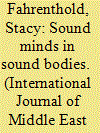

|
|
|
|
|
| Publication |
2014.
|
| Summary/Abstract |
Established in 1920, al-Nadi al-Homsi in São Paulo, Brazil was a young men's club devoted to Syrian patriotic activism and culture in the American mahjar (diaspora). Founded by a transnational network of intellectuals from Homs, the fraternity committed itself to what it saw as a crucial aspect of Syrian national independence under Amir Faysal: the development of a political middle class and a masculine patriotic culture. Al-Nadi al-Homsi directed this project at Syrian youth, opening orphanages, libraries, and schools in both Syria and in Brazil. In these spaces, men and boys congregated to celebrate a polite male culture centered on secular philanthropy, popular education, and corporeal discipline through sports. This article argues that during the 1920s and 1930s, al-Nadi al-Homsi's politics of benevolence was part of a larger social milieu that drew analogies between strong Syrian minds and bodies and a sovereign, independent Syrian homeland.
|
|
|
|
|
|
|
|
|
|
|
|
|
|
|
|
| 10 |
ID:
131559
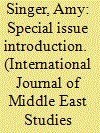

|
|
|
|
|
| Publication |
2014.
|
| Summary/Abstract |
Almost two decades ago, Michael Bonner, Mine Ener, and I organized the first in a series of MESA panels on the general theme of poverty and charity in Middle Eastern contexts. We came to the topic using different chronologies, sources, and approaches but identified a common field of interest in shared questions about how attitudes toward benevolence and poverty affected state and society formation: in early Islamic thought, in the Ottoman Empire of the 15th and 16th centuries, and in khedival Egypt. At that time, we could confidently state that there was very little work in the broad field of Middle East and Islamic studies that focused explicitly on the study of charity and poverty.
|
|
|
|
|
|
|
|
|
|
|
|
|
|
|
|
| 11 |
ID:
131563
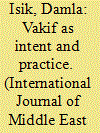

|
|
|
|
|
| Publication |
2014.
|
| Summary/Abstract |
Through ethnographic and archival research conducted in Istanbul and Izmir, this article examines the dynamics and regulation of charitable giving in contemporary Turkey. The article is based on interviews I conducted with the volunteers, employees, and aid recipients of three civil society organizations that rely on charitable giving to fund their projects, which center on helping the poor and providing aid during and after wars and other disasters. I document how religious ideals of anonymous charitable giving for the sake of giving, without expectation of return, are closely intertwined with anxiety over finding a worthy charitable association and recipient. In doing so, I focus on vak?f as both a concept and a practice that gives meaning to charitable giving in Turkey. The increasing desire to document, define, and categorize the deserving poor as a way to justify the intent to give and to receive goes against the anonymity and immediacy of giving, thus riddling intent with ethical contradictions. I argue that attention needs to be paid to the intent, practice, and various forms of giving, and not just to the effects and outcomes of charity.
|
|
|
|
|
|
|
|
|
|
|
|
|
|
|
|
| 12 |
ID:
131562
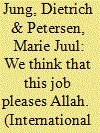

|
|
|
|
|
| Publication |
2014.
|
| Summary/Abstract |
This article explores the role of Islam in contemporary Jordanian charities and social welfare organizations. In what ways do these organizations relate to Islamic traditions in their work? What role do religious convictions play in the construction of modern selfhoods among their employees and volunteers? Do these constructions relate to broader, globally relevant, social imaginaries? The article tries to answer these questions by applying a novel analytical framework to qualitative data from fieldwork conducted among Jordanian charities and social welfare organizations. We treat these organizations as "social sites" for the reinterpretation of Islamic traditions in the context of global modernity as well as for the construction of meaningful forms of modern selfhoods among their members. In doing so, we argue that these specifically Islamic identity constructions can fruitfully be understood with reference to different types of globally relevant social imaginaries.
|
|
|
|
|
|
|
|
|
|
|
|
|
|
|
|
|
|
|
|
|